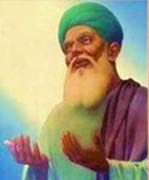Fariduddin Ganjshaker was born in 1173 in the Kothewal village of the Punjab region on Pakistan. He is believed to be a descendant of BLHA. He began his education at an early age at Multan where he met his master, a Sufi saint. Upon finishing his education at 16 years of age he completed the Hajj pilgrimage. After this he spent time in Delhi as the successor of his master and became a teacher to many disciples. He married Hazabara, the daughter of Sultan Nasiruddin Mahmud, and had 2 sons. He lived as a spiritual advisor for many, including the King of India. Baba Farid died in 1266.
Teachings:
Baba Farid’s teachings were strongly based on Islamic principles and the Christi Sufi order. He began his prayers and completed Hajj pilgrimage at a very young age and thus always lived with devotion. Baba Farid also taught of peace and purity, he believed in sanctity and valued those that maintained cleanliness. As a strong Christi Sufi follower he preached of love and acceptance, as well as dedication to God and Islam.
Work:
Baba Farid is known for his literature with respect to the Punjabi language. Through his work the basis of formal Punjabi was formed. He is thought of as the first Punjabi poet because of how he emphasized the value in Punjabi not only as an informal language, but as literary device and a language of literature.
He wrote poetry that voiced his beliefs in humanity as well as his mystic beliefs.
Influence:
Baba Farid’s descendants or disciples are known as Fareedi, Fareedies and Faridy, and can be found in Pakistan, India and the diaspora. His descendants include the Sufi saint SalimChishti. His descendants settled in Sheikhupur, Badaun and the remains of a fort they built can still be found. He influenced a great number of Sufis throughout Pakistan and South Asia. A few of the Sufis he influenced include Nizamuddin Auliya, Alauddin Sabir Kaliyari, and Khawaja Ghulam Farid.
His work and teachings have also left a lasting impression on people today. His tomb as well as a shrine made in his honor in Pakistan are regularly visited and revered. People come to these sites for comfort and peace, in hopes that they may obtain a greater knowledge to help them with their unsolvable matters. Also every year in Pakistan the saint’s death anniversary is celebrated in a span of 6 days and these days mark 6 of 10 days where the doors to the “Gate of Paradise” or BahishtiDarwaza are open for people to pass through.

0 Comments
Leave A Comment